Are German Shepherds Easy to Train? (Answered!)
German Shepherds are well-known for their intelligence and trainability, making them a popular choice for service work and as family pets. This article will delve into why German Shepherds are easy to train and what to expect when training one. Whether you’re a new dog owner or an experienced trainer, you’ll gain valuable insights into the training process and determine if a German Shepherd is right for you.
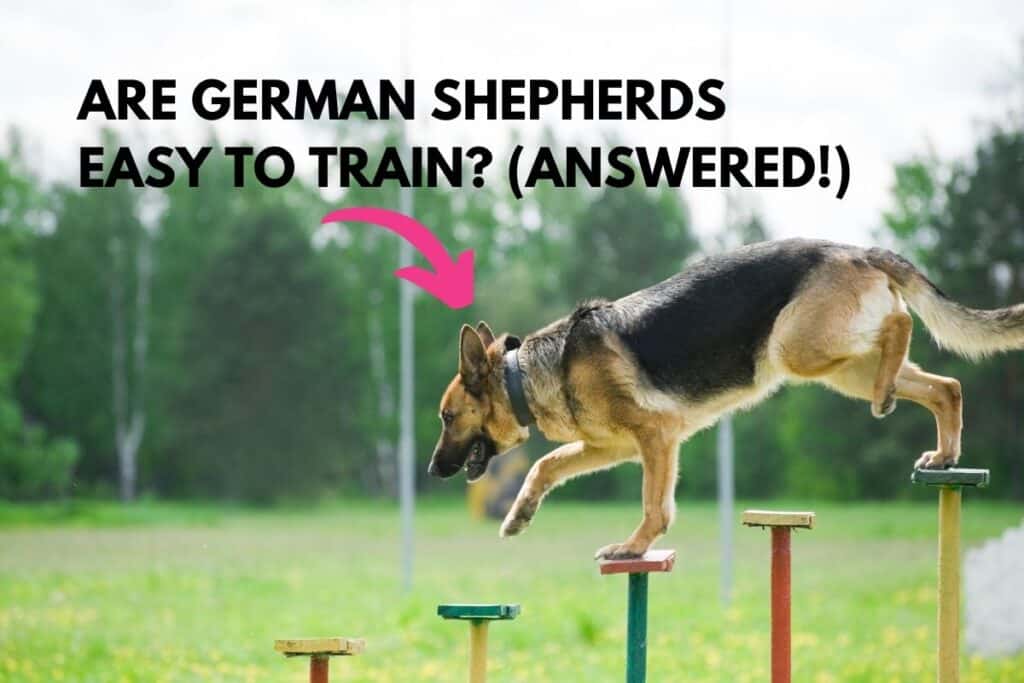
are German Shepherds easy to train?
German Shepherds are highly intelligent and trainable dogs, making them a popular choice for service work and as family pets. Their eagerness to please and adaptability make them easy to train, and their versatility allows for a wide range of tasks to be learned. Whether you’re looking for a trained service dog or a well-behaved companion, German Shepherds can be an excellent choice with the right training approach.
German Shepherds are good dogs for many reasons. Throughout this article, some of those are mentioned, as well as tips and tricks when it comes to training your own German Shepherd.
Why Are German Shepherds Easier to Train?
German Shepherds have a long history of being used as herd dogs, guard dogs, and, in more modern times, police dogs, drug dogs, and even firefighting dogs. Why is this?
German Shepherds originated in Germany, as their name indicates. They originated around the late 19th century and were used specifically as herd dogs, watching over livestock. A job as a herd dog requires determination, a strong work ethic, and a high level of alertness.
They needed to gather livestock in a specific way, and were to keep watch for threats. This means they were bred with the ability to listen, see threats or problems, and to react quickly.
These dogs also have a lot of energy. They had to be able to run at high speeds and keep up with the herds. They are able to focus on their tasks and have a desire to excel.
German Shepherds need attention, stimulation, and a way to expel their energy. They are good at following simple commands and attach themselves to their owners and so want to please them and do well. They’ve been bred to be protective and obedient, and this transfers well into their training.
It’s no wonder so many German Shepherds are used in police, fire, and other forces that require a dog to aid them. With their history, these dogs are perfectly capable
So, with all of that great background, what is the best way to train a German Shepherd? There are a few ways to go about it.
How Do German Shepherds Compare To Other Breeds?
Here is a table of the top 10 most highly intelligent and trainable dog breeds, based on Stanley Coren’s The Intelligence of Dogs:
- stanley-coren (Author)
- English (Publication Language)
- 304 Pages – 02/20/2026 (Publication Date) – POCKET BOOKS (SIMO) (Publisher)
| Rank | Breed |
|---|---|
| 1 | Border Collie |
| 2 | Poodle |
| 3 | German Shepherd |
| 4 | Golden Retriever |
| 5 | Doberman Pinscher |
| 6 | Shetland Sheepdog |
| 7 | Labrador Retriever |
| 8 | Papillon |
| 9 | Rottweiler |
| 10 | Australian Cattle Dog |
It’s important to note that while these breeds are considered highly intelligent and trainable, the individual dog’s ability to learn and obey commands is also influenced by their environment, socialization, and training methods used.
Each dog is unique, and their intelligence and trainability can vary.
Recommended Reading:
If you want to research just how smart German Shepherd dogs really are.
How to Train A Puppy
The best time to train a German Shepherd is when it is very young. When these dogs are trained as puppies, it’s much easier for them to carry the habits that they learn into adulthood.
This is the same way it is with people; the habits we learn as kids can be a lot harder to break once we get older, so it’s best to start off on the right foot at a younger age.
Around eight weeks old is the recommended age to begin training a German Shepherd puppy.
The steps to train a German Shepherd puppy are as follows:
Start by handling the puppy’s paws, ears, etc., gently- You want to do this because a German Shepherd will grow up to be a fairly large dog.
Handling these sensitive areas at a younger age will help keep them from freaking out when they need their nails trimmed, ears inspected, or other things are done. A big dog freaking out can be hard to handle, so getting it used to these things at a young age will be better for everyone involved.
Establish yourself as the alpha- This doesn’t actually have to be you, but whoever does the training should be the established alpha. This does not mean yelling at your dog or reacting harshly when they mess up.
It actually just means remaining calm and confident, and being firm with demands. This will help the puppy know who is boss and who should be listened to. Training by fear, however, can have negative effects on the dog.
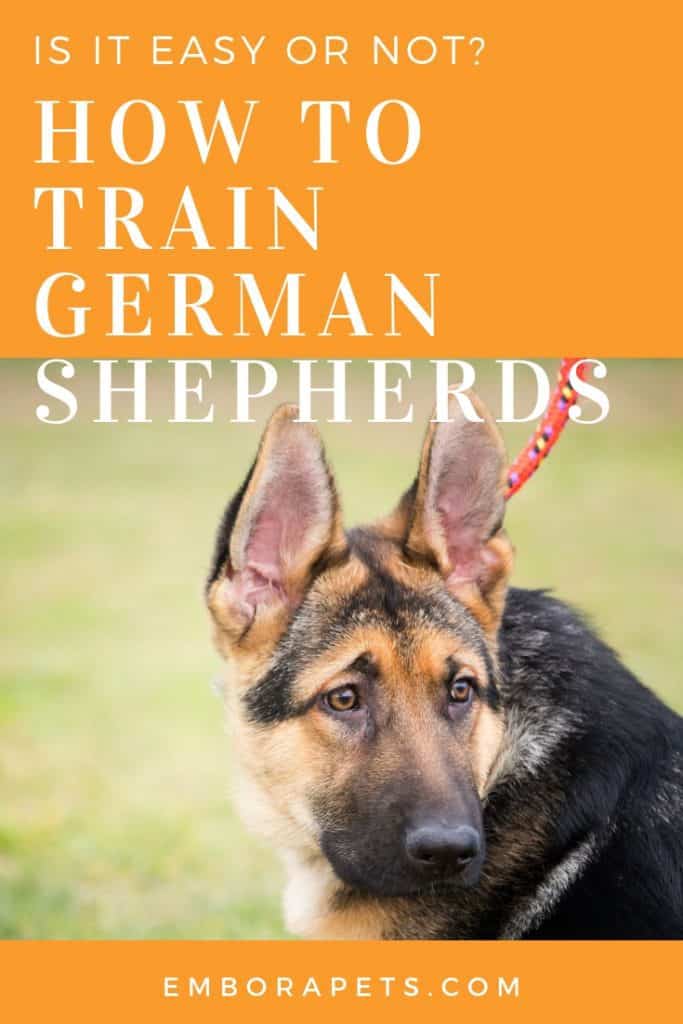
Start by using basic commands- It’s best to start simply with a puppy so that they don’t become confused. Starting with simple commands like sit and stay can help them get used to training in general. And don’t get frustrated when they don’t get it right away, some dogs may need more time than others.
Use treats as a reinforcement and reward- Pavlov got something right when he learned that repetition can be beneficial in training. Many people choose to reward their dogs with treats when they successfully obey a command because it reinforces to the dog that it did the right thing.
By giving your German Shepherd puppy a treat after it sits properly, it will encourage it to want to do it again, because it’s learned that’s the right thing, as they will get a reward. Eventually, you can wean them off of these by not giving a treat every time they complete the task, just once in a while.
“You don’t want to become a control freak, but you do want to make the house rules clear and teach them properly to your pup.”
-Shepped
Check for food bowl aggression- If you pet your puppy while it is eating from its bowl and it growls or stops eating, it may be dealing with some eating aggression. You can help stop this in a few ways. You can make them eat from your hand so they learn to eat around people.
You can slowly pour food in the bowl while they are eating so they see that people aren’t a threat to their food. You can also vary the feeding instrument so they don’t become so aggressive around the bowl.
Help them get used to a crate- Some owners choose not to use crates, but if you do, there are ways to help your puppy get used to it. Make sure it is large enough for the dog when it’s an adult. But blankets and it’s favorite toys in the crate so it knows it’s a good place to go.
You can also put a few treats inside to encourage it. Once inside, shut the door for about 10 minutes and don’t let it out even if it barks. Reward it with a treat or something it enjoys afterward. Eventually, you’ll be able to build up the time so that it can stay there for longer periods of time.
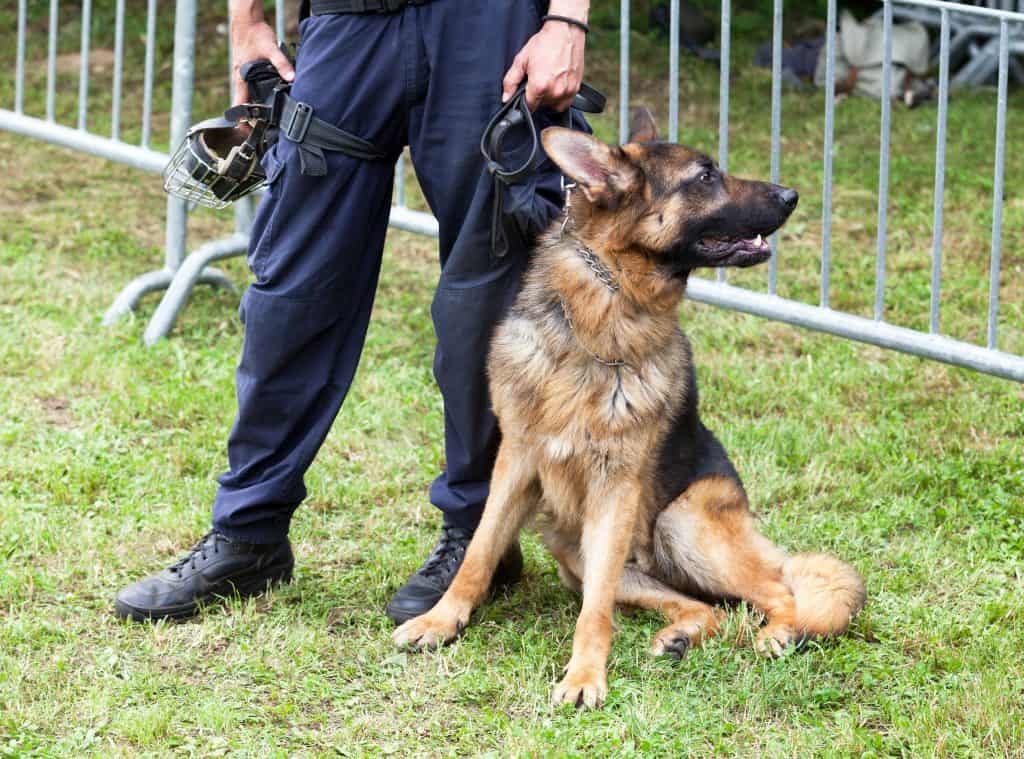
Potty train your puppy- After letting your puppy out of its crate, and within around 10 10 minutes after eating, take your German Shepherd puppy to it’s designated potty area.
This place can vary between owners, but it needs to be consistent for the dog. German Shepherds are smart, so after a while of doing this, it will learn where it is supposed to go when it has to use the bathroom, so to speak.
Ignore or discourage bad behavior- Some puppies like to jump on people, some chew furniture, and some like to nip at people. For things like jumping, it’s good to ignore this behavior and reward and greet them enthusiastically when they greet people calmly and in the correct way.
Using a bitter spray on things you don’t want them to chew can be good, and distracting them with their favorite toy may help. If it bites you, make a high-pitched noise and wait ten seconds before resuming play, and repeat if necessary. Reward your puppy when it behaves correctly.
Socialize your puppy- German Shepherds are known to be extremely loyal. This can be great for you and your family because it will want to protect you. However, when friends come over, it may not take too kindly to them unless it’s been socialized properly. Do this by taking your pup out often and going to places where it can be around a lot of other dogs and people.
Places like parks can be good for this, but anywhere with new people works. Eventually, your dog will learn to be less wary around strangers, dog or human, and so it won’t react as violently when new people come over.
How to Train an Adult German Shepherd
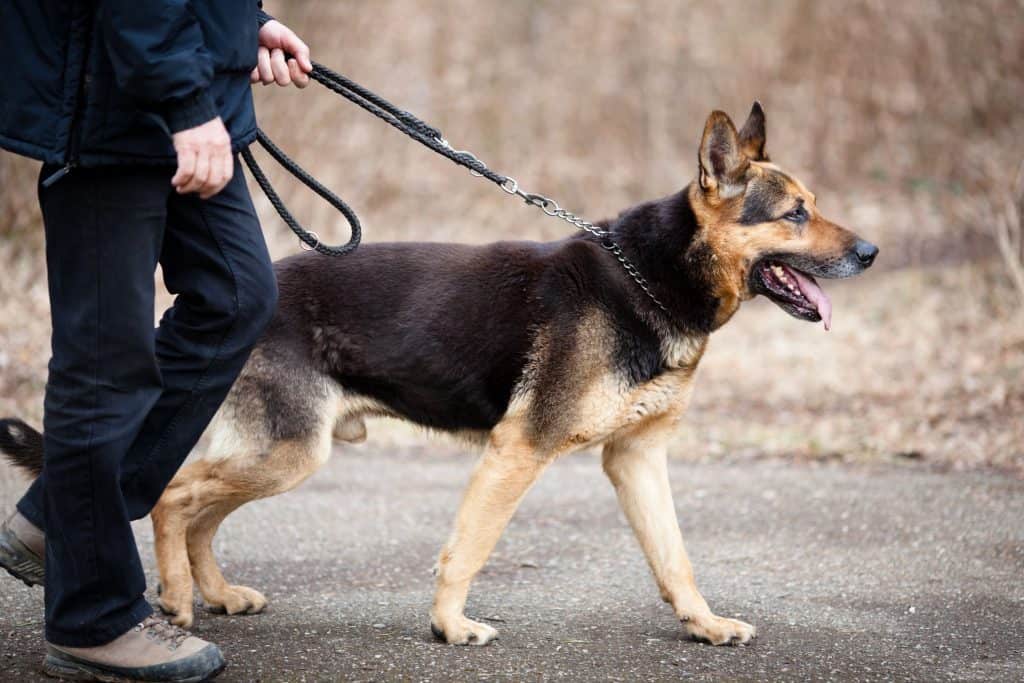
While it is recommended to train your German Shepherd when it is a puppy, that’s not always possible. Perhaps you got your dog as an older dog, or perhaps you never trained it as a puppy. Whatever the reason, it’s still possible to train an adult German Shepherd, but it may be a bit more difficult. With persistence, however, you can still succeed.
Here are some tips to help get you started:
Begin with the basics- It’s good to start with the simple commands and see where your dog is at. If your dog doesn’t know the basic commands such as sit and stay, teach it in the same way you would a puppy. Keep your sessions shorter and happy, and give them breaks in order to build trust and to lessen possible frustration.
Give rewards quickly- Rewards can come in the form of treats, a favorite toy, or praise. It’s important, however, to give it to your dog immediately after it completes the task.
This is because if you wait too long and it does something in between the completed task and the reward, it will think the reward is for that. And same with the puppies, after your dog is consistently obeying your commands, you can phase out the rewards by how often you give them or the quality of it.
Use a clicker- This is not a necessity, but many dog owners find this to be an effective way to train their dogs. A clicker associates a sound with a reward and an action, and it is a tool that can help a dog learn commands very quickly. This is helpful because you can click and then give a treat, lessening the stress of having to give a reward immediately after it performs the command.
Do the same things that you would with a puppy- This makes sense because training is often repetition and reward, so that doesn’t differ with age.
However, it will likely take more time and patience with an older dog, so you have to be certain you’re willing to put in the time and that you have the patience. Older dogs may have learned bad habits, so it can take a bit to unlearn them. Be consistent with the training and eventually your dog should learn what is expected.
Take it to a specialized training facility– Many places exist that are made specifically to help train a dog. These places can take in puppies as well, but if you feel overwhelmed training an older dog, the help of a training facility can be extremely beneficial.
Look up some in your area and try it out. You may even want to stay for a while to see how they train your dog and ask for advice. Consistency is key, so even if you take your dog to a facility, it’s important that you keep up with the same training when you take your dog home with you.
Common Mistakes Made While Training
Most people who train a German Shepherd have good intentions, but they may not always know much about training dogs, and so can be prone to making mistakes. Here are a few mistakes to be aware of, and ways to avoid them.
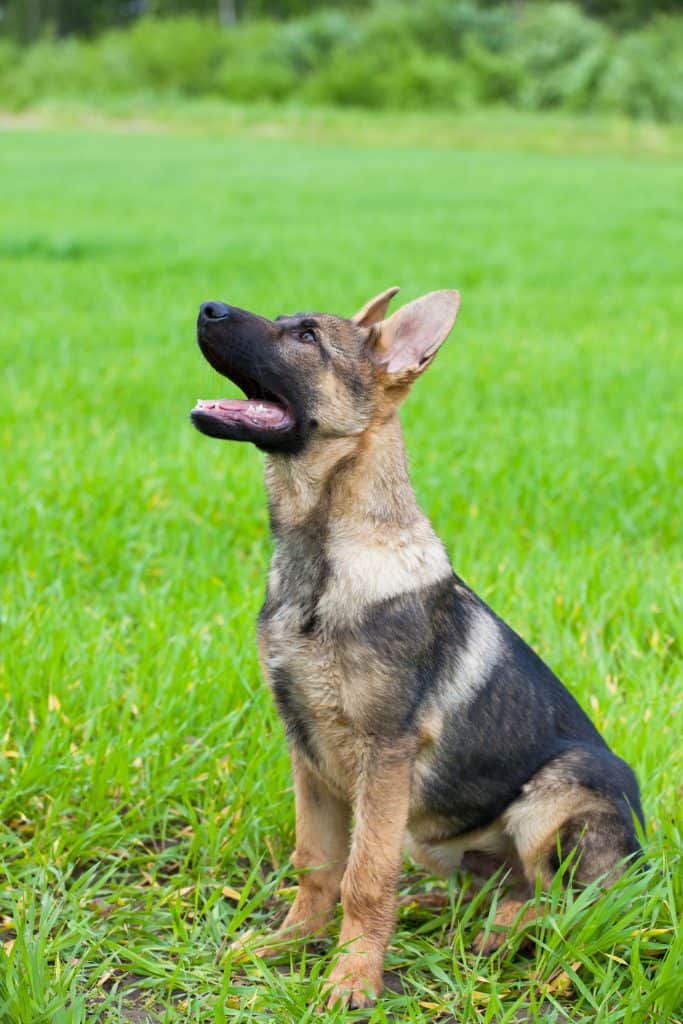
Using a Forceful or Violent Approach
Some people may think that being the alpha means being aggressive, and they might yell at or react violently to their dog when it messes up or doesn’t obey commands. This is a poor way to train German Shepherds.
German Shepherds do not react well to violence and aggression and so can be known to act out in response. This is often in self-defense and ultimately will destroy the trust you have with your dog. Instead of violence or aggression, remember to stay cool, calm, and confident. You can be firm without inciting fear.
Positive reinforcement and kindness is best with German Shepherds. This will build love and trust, and will create a better experience for all involved.
Not Being Consistent or Repetitive
If you use different methods to train your German Shepherd the same thing, it will likely get confused. Using the same commands and actions is best in order to avoid that.
When a dog successfully obeys a command once, you shouldn’t stop there. Repetition is vital to really help your dog understand what it’s supposed to do. Repeat tricks several times, and over several sessions so that it can really understand what things mean and what you’re asking it to do.
Sometimes multiple members of a family want to train the dog, but they will use different methods and not be repetitious. There are two ways to solve this. You can make a rule that only one person is training the dog in order to avoid confusion. You can also sit down with the family before training and establish your method and schedule so that everyone is on the same page.
It’s still good to have one person take charge, but involving everyone can be a good family activity, so long as everyone is consistent and don’t confuse your dog.
Not Socializing your German Shepherd
This was mentioned earlier, but it is super important to remember. Sometimes a new dog can be exciting, and you want to spend time with it at home, and you can forget to take it out and about with you. This can lead to aggression with strangers and other dogs later in it’s life. That won’t be good when your German Shepherd is fully grown, as it can scare a lot of people.
Be sure to take your dog out and introduce it to many new people as early and as often as you can. This will help you avoid many problems later once your dog gets older.
Things to Remember
German Shepherds are highly intelligent dogs, and so they can be easy to train. It’s vital to remember, however, that easy doesn’t mean that you have a few sessions and you come out with a perfect dog. It simply means that your dog will pick things up fairly quickly compared to other breeds and that it is willing to obey.
Training a German Shepherd still takes time, patience, and effort. When considering getting one, think about your lifestyle and if it will be able to support the work it takes to train one.
If you’re willing to put in the work, a German Shepherd can be a great addition to your home. You’ll have a loyal, energetic companion that can bring a lot of joy into your life.
Related Questions
Is a German Shepherd a good family dog?
German Shepherds are excellent family dogs if they’ve been trained properly. This is because they are loyal, protective, and energetic. They are intelligent, calm, and caring, and so can be great for almost any family dynamic.
Do German Shepherds need a lot of exercise?
German Shepherds are known to be energetic and intelligent. This means they need to exercise their body and mind a lot. Around 2 hours of physical activity a day is a recommended amount, and keeping its mind busy with new activities or tricks can be beneficial.

